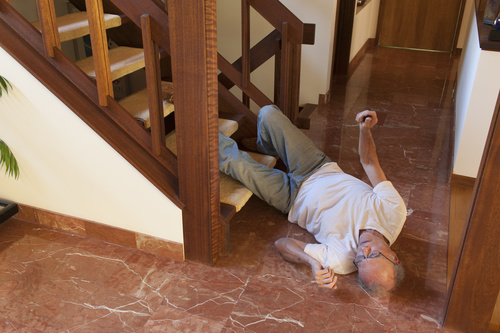It is estimated that roughly 20 million people seek medical attention every year due to accidents that occur in the home. This can be anything from stove top burns to broken limbs from a trampoline, falling down the stairs to choking. While we like to think that our homes are safe spaces for ourselves and our families, there are many precautions for people to take. People also like to wonder, particularly those that rent their homes, if there is anyone that can be faulted for accidents that do occur.
The short answer is: sometimes. There are absolutely certain aspects of a home that a landlord or property manager needs to ensure is in livable and safe conditions for residents. There are also issues that are either up to the tenant to upkeep or it is their responsibility to notify a landlord or property manager that there is an issue at all. The below accidents are a few different cases where injuries were deemed to be due to the fault of landlord negligence:
Slips and falls
Slip, trip or fall cases are rarely minor, especially if stairs or tile are involved. Any of these types of incidents may be caused by poorly fitted carpets, loose floorboards or missing floorboards or uneven paving. Leaks in the roof or walls may also lead to slips or falls on the property. Always be sure to notify landlords when a leak is present. Leaks can lead to harmful damage if left unattended. Only if you have made a leak known to your landlord and they fail to fix the issue will they be held responsible. If you do not share the issue with them, they have no way of knowing you have a leak.
Poor maintenance
When a home or property has consistent maintenance issues and the landlord fails to address ongoing problems, an accident may be in part due to landlord negligence. These incidents may include a poorly maintained ceiling which later collapses, or leaking faucets that cause flooding. When notifying landlords of maintenance issues, be sure to have a record of your own. This may be via email, text or screenshotting a portal message if your unit communicates with management via an online platform.
Exposed Wires
If you or another tenant are electrocuted due to exposed, unkempt wires, a landlord may be responsible for any injuries or damages. When you move into a home or over time if you find an exposed wire, be sure to not touch it and notify a landlord or property manager right away.
Carbon Monoxide Poisoning
Carbon monoxide poison claims may be brought against a landlord if it is proven that they did not take adequate steps to prevent it. Landlords are responsible for making sure all gas appliances are safe, with regular gas safety checks in order to avoid leakage or poisoning.
Mold
Lack of ventilation or leaks which result in mold may cause respiratory problems that can be attributed to lack of habitable settings may be deemed landlord negligence. If you start to notice a change in air quality, or inexplicable rashes or respiratory issues, it is best to get a mold test and notify your landlord immediately.
As you can see, there are a number of ways that a personal injury case may be brought against a landlord. It is important to notify a landlord of any maintenance issues as soon as they arise to avoid health issues or damages that put yourself, your family or your home at risk.
When a landlord does fail to make repairs or communicate with tenants regarding damage, then after thirty days, a tenant may either cancel their lease without consequence, go with the repair and deduct remedy or they may bring a lawsuit against the unresponsive landlord. The deduct and repair remedy is when a tenant withholds the amount that they paid in repairs from their rent. Tenants are able to do so in amount up to their rent amount. For example, if a tenant needs to fix a leak in their home after the 30 days of waiting for their landlord to do so, they may pay up to their $2,500 monthly rent they pay to do so. This doesn’t mean that a tenant may use $2,500 on fixer uppers around their apartment or home. They must be able to show receipt of the damages and repairs done.
Landlords are also required to upkeep common areas of the rented units. If everyone shares a laundry room or there is a communal living room or office space, it is up to the landlord to maintain them. They are also required to keep both private and communal spaces up to housing codes as defined by local and/or state law, ordinances and other governing regulation organizations. Failure to do so may put them at risk for losing their property.
If you are currently dealing with a personal injury at the fault of a landlord, call The Braddock Law Firm today to discuss your case. Be sure to keep record of all contact you have with your landlord as well as clear documentation of your, and progression of your, injury or injuries.



